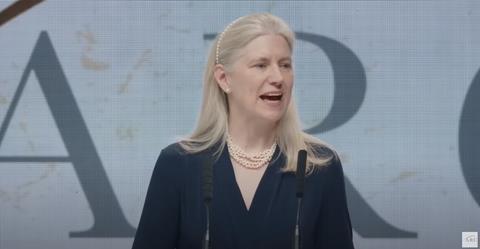A new coalition of influencers, including Jordan Peterson, Miriam Cates MP and Baroness Stroud, believe that in order to solve the West’s problems, we must return to our Judeo-Christian foundations. Heather Tomlinson reports from the inaugural ARC conference

“We’ve seen an unravelling of the pillars on which our societies are built and a collapsing of the way in which we interact with one another - it’s time for us to rediscover the better story,” exhorted Baroness Philippa Stroud to a packed hall.
She was opening the inaugural conference of the Alliance for Responsible Citizenship (ARC) last week, which drew 1,500 politicians, artists, journalists, academics and business leaders from all over the world.
Unusually, many conservatives and Christians were included. While they stopped short of explicitly advocating for Christian faith, the unifying message was that we must return to a Judeo-Christian worldview and all that was good in traditional Western civilisation.
Throughout the three-day meeting in London’s Greenwich, many phrases familiar to Christians were repeated over and over again. The extraordinary value of human life. The search for the good, the true and the beautiful. The necessity of restoring the family and prioritising parenthood. Virtues such as courage, kindness, faithfulness, gentleness and self-control. Hope and a better story.
The walls were covered with inspiring quotes, from Bob Dylan and Martin Luther King to Dietrich Bonhoeffer and even the biblical prophet Jeremiah.
Given the widespread apocalyptic zeitgeist of division, despair and gloom the speakers’ relentless optimism was piercing, and provoked long and enthusiastic standing ovations from the audience.
ARC has been described by one of its co-founders, controversial psychologist Jordan Peterson, as a new alternative to the World Economic Forum, the annual meeting of the world’s most powerful people that has become controversial in recent years.
For Peterson, and others like him, the WEF is an elitist group of globalists and centre-leftists. ARC, on the other hand, was broadly centre right, with notable exceptions such as evangelical Christian SNP politician Kate Forbes. Speakers included respected Christian and Jewish leaders – including Pentecostal church leader Pastor Agu Irukwu, Catholic Bishop Robert Barron and Orthodox Christian writer Jonathan Pageau – mixed with Conservative MPs such as Miriam Cates and Michael Gove, artists, YouTubers and NGO leaders - including many pro-life charities. Political and economic talks were interspersed with discussions about art and beauty and performances by classical musicians and tattooed Christian spoken word artist Joshua Luke Smith.
Evangelical speaker Amy Orr Ewing spoke about the importance of forgiveness to Western civilisation and its threat from recent trends such as cancel culture. London pastor David Stroud - the husband of Baroness Stroud - gave a stirring speech about how Victorian society was transformed by Christians confronting wrongs and injustices with practical love.
The American Catholic leader Bishop Robert Barron spoke theologically on the relationship between freedom and responsibility. Freedom and its importance to Western society was a recurrent theme from both secular and religious speakers, restrained by virtue in order to limit our worse impulses and point us towards the Good.
Freedom in the economy was one area of difference in the panels and audience members. On one hand Republican congressman Kevin McCarthy yearned for a return to free-market Reaganomics. “Government is not the solution, government is the problem,” he said, though the response to his nostalgia was mixed, especially from more left-wing British Christians present. Perhaps most controversially there were speakers such as Bjorn Lomborg questioning global efforts to reduce carbon emissions, and panels discussing the impact climate change policies will have on the world’s poorest and global security.
There was plenty to encourage those who despair at the harms done by family breakdown. Psychoanalyst Erica Komisar outlined a five point plan to turn around the tsunami of childhood mental health problems by restoring families, creating time to spend with children and valuing parenthood. Feminists Mary Harrington and Louise Perry criticised the sexual revolution. Miriam Cates spoke about falling fertility rates, the collapse of marriage and its impact on the poor.
You may be wondering, what about Christ? What about the name of the one who underpins all of these positive values and what was good about Western civilisation? This was the reaction of some Christian attendees. The church has debated over centuries whether its engagement with the world can or should promote Christian virtues alone for general human flourishing, or whether it should only preach the gospel and faith in Christ.
The latter is a huge leap for a secular culture steeped in materialism and scientism. But the conference demonstrated a new hunger for Judeo-Christian values, perhaps best illustrated by a dramatic change of heart from the Somalian refugee Ayaan Hirsi Ali, whose public criticism of Islam once led her to New Atheism. She told the conference that when she first rejected her childhood faith, she believed the “three letter word of God stands just for evil” as she befriended uber-atheists Sam Harris, Christopher Hitchens and Richard Dawkins. Now, she is “proudly” Judeo-Christian and aspires to its values. She said the “does God exist?” debate was the “wrong conversation.” The “right conversation” was to compare the different human conceptions of the transcendent.
In their fascinating panel discussion on Western Civilisation, Christian speaker Os Guinness described it as “a cut flower” separated from its Christian roots. “People are still relying on the flower, but a flower in a vase will die.” We are threatened with barbarism, he warned.
Ayaan’s response was more hopeful: “That is true, cut flowers do die. But what we have in terms of Western Civilization is a lot of seed packets. And I want to send you off with these seed packets…we have the remnants, the symbols of Western Heritage and their seeds, and all we have to do, those of us who inherited it and enjoy it, is to go and seed them grow them, nurture them, water them and when they’re attacked, fight for them.”
This call to action echoed throughout the conference. “We can’t just wait for someone else to act, we all need to take responsibility, we all need to play our part in rebuilding a better world,” said Baroness Stroud.
In a world that seems to be falling apart, with diabolical threats from every side, we may soon discover what has been built on sand and what has been built on rock. There is a danger that Christians and people of good will are so afraid of conflict that they freeze and avoid building anything at all. ARC seems to be calling us out of inertia and back to the battleground.






































1 Reader's comment